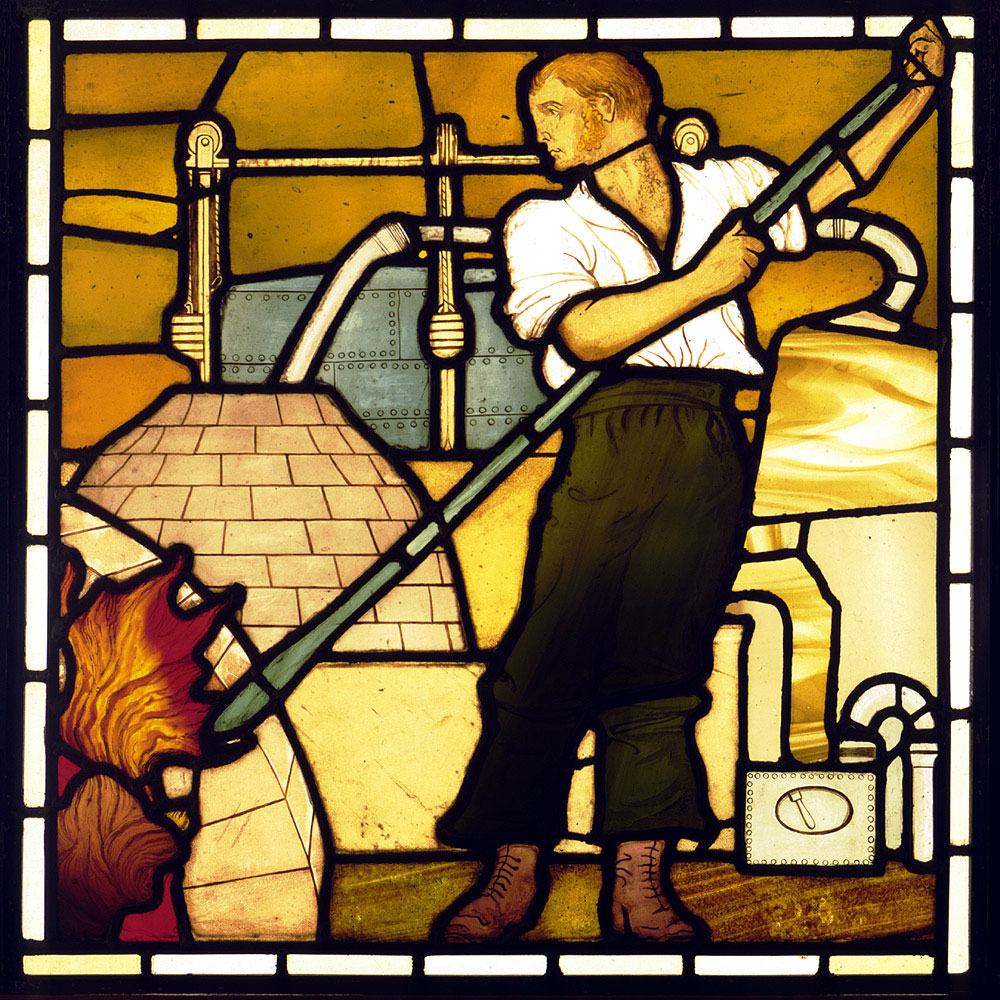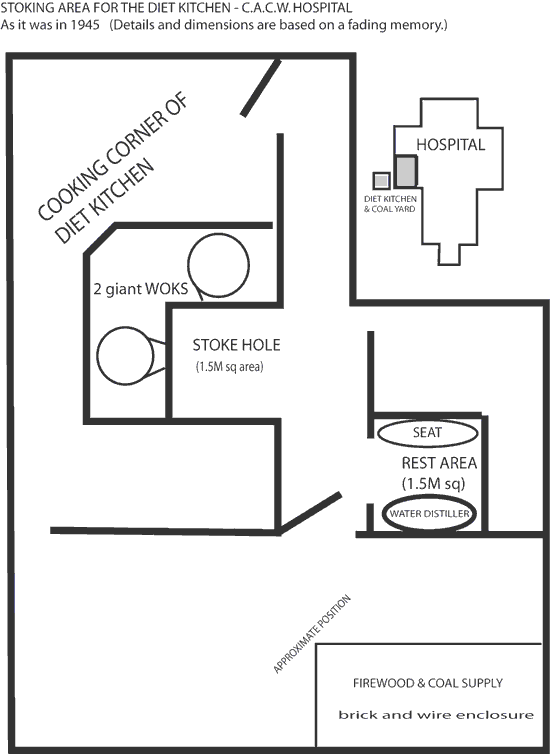
about pumping and stoking ...
Those few words on 'stoking'. Now, upon reflecting on the subject, I feel something should also be said about, 'what came before', as a lead up. Maybe it's a bit too dramatic but I see it as...............
A Human Metamorphosis.
(How it changed us and how we coped)
Our comfortable life style, as foreigners living in China in the early 40's, was rudely interrupted when as enemy nationals of the occupying Japanese, we were 'bundled off', somewhere, to internment and an uncertain future.
As a thirteen and a half year old, I was less concerned of the consequences than my mother and had less trouble adjusting to this new way of life. It was a bit like a new adventure for me!
We soon found ourselves, men, women and children of all ages, in confinement, in a relatively small enclosed compound, which I later learnt, was called, 'Weihsien'.
After almost 60 years, I am a bit vague on most of the precise details but feel we must have arrived at the camp in mid afternoon, to be inducted as 'inmates', counted and given a number, and then we must have been allocated a 'place' to bunk down. That place, I was soon to realize was one small 12 x 9 foot (less than 4x3 metres) room in a row of 10.
After everything entailed in 'moving in', we were given the glad tidings that there was a 'meal' waiting for us, in 'our' dining hall/kitchen. (The last arriving Peking group, in '43 had 'Kitchen 3'.)
That meal, was 'Octopus soup' which I couldn't stomach and went hungry for the first time that night.
That meal, I was later to realize, had been prepared by earlier Peking arrivals, no doubt, Americans.
(The British group followed the American group into Weihsien.)
Work for yourselves! This was to be the basis of our existence in internment.
There would be no one to 'wait on us' anymore, while we were here! There would be no more 'servants' to wash, clean and cook for us, here! The Japanese certainly weren't going to do anything for us!
We had do everything for ourselves! And that is quite a story on it's own, which is well documented in Langdon Gilkey's book, "Shandung Compound", which covered all the 'trials and tribulations' of how that labour (the business of every able person doing their bit towards the up keep of the community on the whole.) was organised.
But this is my little story on how it was for the most 'junior' of that labour force.
Essentially, we had to stay alive! So feeding ourselves while maintaining a degree of hygiene came first.
The common factor, needed for both, was water ! And it's only source to the camp was by pumping it out of the ground, from about 5 or 6 wells, scattered around the internees section of the compound.
The wells were positioned adjacent to the kitchens, bakery, hospital and the shower blocks. With the pumping set up being that a constant flow of water had to be forced into tanks, perched atop 10 metre towers, adjacent to these dilapidated, old classic suction type, manually operated pumps, situated on a platform positioned directly over the well.
The limited number of able bodied men, who were willing to 'do their share', carried the bulk of the heavy work load. Which was mainly in the bakery and kitchens on regular shifts, involving designated days on and off, through each week, with insufficient hands left over to man the pumps, which many internees didn't realize, had to be kept operating, almost around the clock, for the duration of our interment. I often wondered, how would we have faired, had the wells dried up?
So, the job of pumping water for all our needs, fell upon the strength and stamina of the younger 'men', down to the 14 age group. Many in our present "Topica" chat group were, (sadly?) too young to be drafted into this under age labour experience, but a couple of us, are still around, to give the story the light of day and help make you aware of what you missed.
Naturally, a 'tricky roster' needed to be drawn up to cope with the confusing issue of 'who' was 'on' and 'where'! (Remember there were half a dozen pumping stations operating at the same time.) And there had to be a constant 'stream' of 'boy power', coming and going, to and from shifts.
These shifts varied in duration from 30 minutes to 2 hours, dependant on ones age.
To begin with, I was started on one 30 minute shift, per day. And if you are wondering what it feels like, standing over a pump, working the arms while bending the back, up and down, constantly for up to 500 times in each 1/2 an hour shift ? I suggest you try it. It's 'bloody' back breaking work.
 In 'no time' at all, it was turned into a 'one hour shift, and the fun was fast fading, even though you could usually rely on a few minutes of jovial company, from your on coming reliever.
In 'no time' at all, it was turned into a 'one hour shift, and the fun was fast fading, even though you could usually rely on a few minutes of jovial company, from your on coming reliever.
It was always considered 'a no, no' to expect anyone to keep pumping till you arrived!
With the passing of a few more months, the powers to be got even 'tougher' and the 'penalty' now, was 2 shifts (one am and one pm) per day. Now it was pure monotonous drudgery! No other word for it.
You became more obsessed watching the people coming for a shower, knowing they would be the cause of your hard earned gains, on the water gauge, being eroded. Inevitably you had to work harder too, as a log book had been introduced to discourage the 'poor performers'.
Then, some time in my sixteenth year, the word came down that 2 x 2 hour shifts were to be my lot.
Enough is enough!
I'm pleased to be able to say though, I did give it a try before handing in my resignation, with the proviso that I wanted the "stoking job" at the hospital! Thankfully, I got it almost immediately.
 So, off I went to join 2 other 'young fellas', Nick Orr and Alioshka Marinellis( the Greek lad who was killed in the fall from that tree on 'Main Road') as happy hospital stokers.
So, off I went to join 2 other 'young fellas', Nick Orr and Alioshka Marinellis( the Greek lad who was killed in the fall from that tree on 'Main Road') as happy hospital stokers.
Now, this was a whole new ball game!
Maybe, it wasn't so much as the caterpillar turning into a butterfly, trick.... but... more like the simple satisfaction that I had managed to 'wangle' the change to a boy taking on 'mans' job.
I was now issued with a pair of overalls, shown over that corner of the hospital where the 'diet kitchen was situated and keys to the coal yard was kept. 2 large cooking vats appeared to be our main concern, under which we were expected to keep the fires burning, in spite of the poor draught and coal quality.
The routine in this job, for one thing, was vastly different to 'pumping'.
Two men were allocated to each shift, which was 12 hours long, beginning at 4 am. But we used to split the shift in half,( making it an easier 6 hour day,) with the one doing the morning shift having the added job of drying the kindling for the next mornings re-firing up. Then alternating the shift arrangements.
The early man also had the 'eerie' walk, across a slumbering camp, never quite sure if someone (or even a Jap guard) or something was going to jump out from behind a tree and scare the daylights out of him.
The dead of night is not a completely silent place either, some insects and animals, even in camp, were nocturnal and often on the move. Besides, when walking past the rooms of the sleeping internees, it was surprising how noisy some of us are, even in complete repose.
Waking at 3:30 am was always a problem in my teens, and often wondered how much sleep my dear mother must have missed out on in watching the clock for me?
At the time, this job with the early hours was well worth the effort, as it came with a most envied 'perk'. The hospital staff, while on duty, had their (hospital) meals, there. Need I stress what a plus that was?
Breakfast was lighter than lunch, of course, but the tradition was, we got a slice of toast smothered with 'delicious' dripping around about 10 am, to keep us 'going'.
I can't imagine myself swallowing anything like that, today!
The rest of the working conditions weren't bad at all, even the feeding of the small furnace fires from the cramped confines of the 'stoking hole' was okay and in my opinion, I thought shovelling a few spades of coal and ash was a lot easier than the back breaking 'pumping' action any day.
I also realize now it was the 'boys' manning the pumps who should have been given extra rations to keep them going for their 'punishing' weekly hour tally, especially when it got up to the 4 hour a day mark.
Nufsed!
I've had quite enough to say.
I realize you only asked me only for the short tale on 'stoking' from Janette's email, but in my opinion, it was the frustrations from the pumping job that drove me, to more or less, demand a change to stoking, and I wanted to make that understood.
Besides, it was the story about the job the boys in camp did, that all of us benefited from, which deserved telling, if you know what I mean. I remember walking in the wintery, early morning darkness for my shift at the bakery pumping station, but I can't remember how we unfroze the pumps though. (The water coming up the pipes from down below would not have been frozen, of course.)
#





